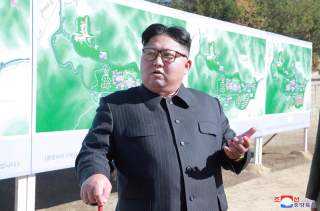North Korea and America’s Second Summit: Here’s What Ian Bremmer Thinks Will Happen
"So long as Donald Trump continues to signal that he’ll meet with Kim Jong-un no matter what, then Kim has no incentive to change behavior."
Editor’s Note: Want more ideas on what will happen at the summit? Check out all 76 expert opinions we gathered here.
Since the first summit in Singapore, U.S. President Donald Trump has been consistent on messaging: Pyongyang has given him more than they’ve ever given another U.S. leader (true), and he’s the only president who could have made this kind of progress (also true). The problem is that North Korea, despite all the headlines, has done nothing to address the underlying issues that make it such a threat in the eyes of U.S. security officials. But so long as Trump continues to signal that he’ll meet with Kim Jong-un no matter what, Kim has no incentive to change behavior. U.S. Secretary of State Mike Pompeo has met multiple times with the North Koreans in preparation for the summit, and is growing visibly frustrated with the lack of progress on all substantial fronts. Trump shares exactly zero of those frustrations. And so long as Trump is president and he wants this détente with Kim, he can have it. So from that perspective, this second summit is looking relatively steady-state. It will be a success because Trump will declare it to be.
But it’s impossible to overlook the fact that it’s precisely because Trump’s not gunning for a breakthrough that’s impossible to achieve that his engagement with Kim is bearing real geopolitical fruits—it’s just that others are reaping most of the benefits of that engagement, South Korea first and foremost. Things are now dramatically better between the two Koreas than they were before; some of that has to do with South Korean president Moon Jae-in to be sure, but a whole lot of that has to do with Trump. Ties between Beijing and Pyongyang have improved as well; while North Korea has long depended on China as its lifeline to the outside world, Pyongyang is now proving useful as leverage on the geopolitical front as China tries to navigate its quickly-deteriorating relationship with the United States. Even relations between Japan and North Korea have improved as Tokyo grows wary of U.S. security commitments in the region. Taken together, tensions in and around the Korean peninsula have been reduced dramatically because of Trump. And even if Trump is succeeded by a more hardline U.S. president when it comes to dealings with North Korea, that reduction in tensions among Asian neighbors looks likely to persist. Relations between North Korea and the world are dramatically better than they were ten, five, or even just one year ago. And the world has Trump to thank for that.
Ian Bremmer serves as president of the Eurasia Group, a political-risk consultancy, and a Global Research Professor at New York University. He is the author of the new book Superpower: Three Choices for America’s Role in the World.
Image: Reuters


